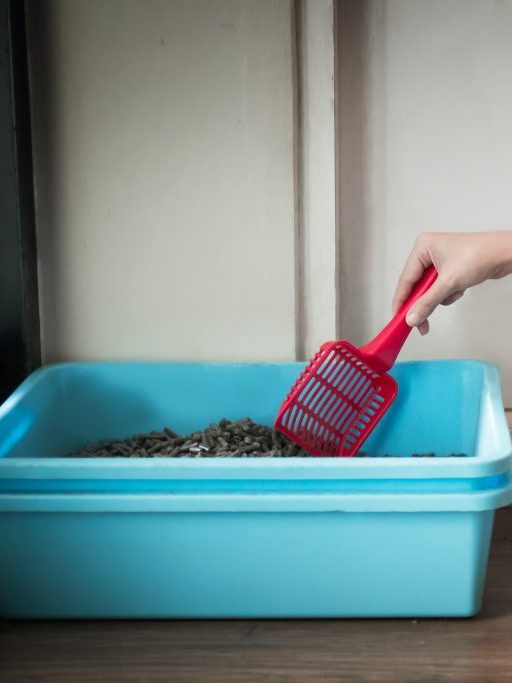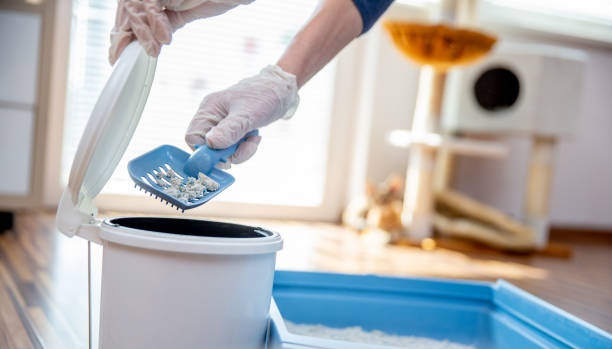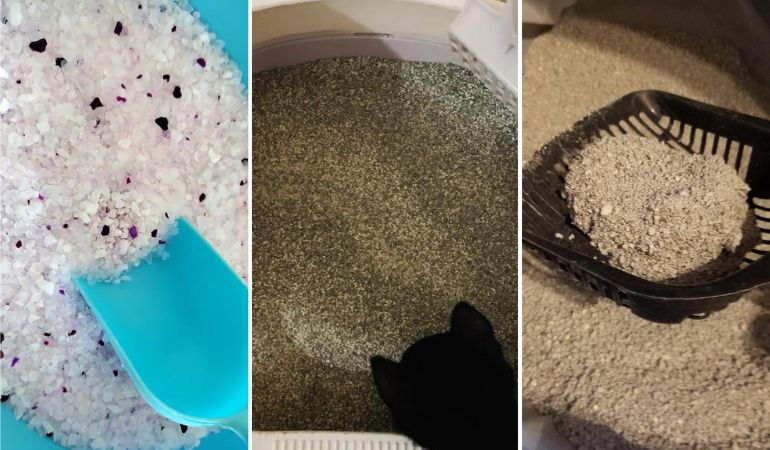Table of Contents
Effective Tips against bad smell from the litter box
Hi cat parents! We all know that stinks from the litter box are extremely unpleasant for both cats and humans. In this article I will share what causes the stench and how you can best eliminate the bad smell from your kitty litter box.
Cats are very clean. Bad smells from the litter box can make them avoid that place and do their business elsewhere in the future. A smelly litter box is also a major burden for the cat owner. Here are the causes of bad odors from the cat’s litter box litter box and what you can do about them.
Causes why the litter box stinks
If the litter box starts to smell unpleasant despite regular cleaning and changing the litter, these reasons can be the cause:
- Too little litter in the litter box – recommended value: 5 cm
- Not enough litter boxes if you have multiple cats in your home – benchmark: one litter box more than cats in the house
- Cat litter that binds odors poorly
- Replacement of plastic toilets too infrequently – recommended value: once a year
- Food intolerance or illness: Smelly feces or excessive urination can be an indication of an illness and should be clarified by a veterinarian.
Instead of covering up bad odors with scents, the causes of a smelly litter box must be eliminated.

7 best ways to reduce bad smells from the litter box
Unpleasant odor from the litter box puts a strain on cats and humans. Cats are very clean and a smelly litter box will cause your cat to avoid using the it.
Read ahead to know how to proceed to permanently eliminate bad smells:
1. Empty the litter box daily
The droppings should be removed from the litter box with a litter scoop at least twice a day , ideally even after each visit to the toilet . Make sure you catch even small lumps. Removed litter must be replaced regularly so that the litter is always about five centimeters high.
2. Deep clean the box and eliminate litter regularly
The litter box should be completely cleaned once a week . To do this, the litter is removed and the litter box is scrubbed vigorously with hot water and a neutral cleaning agent. Before it is refilled, it must be completely dry. Cleaning it regularly will keep the odor at bay.
Aside from cleaning, wash the litter box with vinegar to neutralize the urea. However, it is important to then rinse it off particularly thoroughly with clear water.
3. Replace the litter box frequently
Plastic litter boxes need to be replaced regularly. The guideline is once a year . As soon as the plastic floor is roughened up by the scratching and the aggressive urea, the smell stays there particularly well. If you notice this, consider replacing the toilet.
Ceramic or enamel litter boxes are more expensive than plastic litter boxes, but are more durable and easy to clean.
4. Place box liner at the bottom of the litter box
In order to protect plastic litter boxes from concentrated urine and to make complete cleaning even easier, there are hygiene bags or litter box liners for this purpose. These resemble a garbage bag and are clamped under the edge of the litter box as an insert and then filled with litter. They are scratch-resistant so that the cat does not tear holes in the hygiene bag when it buries.

5. Choose the right bedding
The choice of litter also affects odors from the litter box. Clumping litter is particularly good at absorbing odors, while non-clumping clay-based litter is less effective. In addition, the litter box should be filled with at least five centimeters of litter.
There are specially scented litter for the litter box on the market. However, not every cat likes these artificial scents.

6. Odor-controlling litter boxes
There are some odor eliminator filter litter boxes on the market that need to be plugged into an outlet. Even in closed litter boxes , an activated carbon filter prevents the odor from escaping. However, it remains in the toilet. Closed litter boxes are also not accepted by every cat.
7. The right location
When setting up the litter box, you should also make sure that it is in a well-ventilated place where you can simply air it out for a short time. In this way, bad smells disappear in a short time.
8. Baking soda to protect box from smelling
Another best way to keep the litter box smelling fresh is to sprinkle little bit of baking soda on the bottom of the box. Baking soda absorbs all the bad odors from the litter box and keep it fresh.
Scented aromas against smelly litter boxes
Many cat owners try to mask bad odors from the litter box with pleasant scents. But aroma lamps, automatic aroma diffusers or aroma stones next to the litter box are not a good idea. Cats are very sensitive to essential scents and may start avoiding the litter box.
For long-term success, it’s better to target the source of bad odor from the litter box than to try to mask it.
Final Thoughts on Cat Litter Box Odor Control
In conclusion, maintaining a clean and odor-free cat litter box is essential for both you and your feline friend. By following these 8 effective cat litter box odor hacks, such as cleaning out the litter box at least once a week, using soap and water for thorough cleaning, and paying special attention to older cats’ needs, you can ensure a fresh and comfortable environment for your pet. Remember, how often you clean the cat box can greatly impact your cat’s happiness and well-being, so make it a regular part of your routine to keep both you and your beloved companion happy.
Cat Litter Box Smell Hacks – FAQs
Q: What is the best cat litter for controlling odor?
A: The best cat litters for controlling odor are those that are designed to clump effectively, such as Skoon cat litter. Look for litters that have good absorption capabilities and can neutralize odors, keeping the litter box smelling fresh.
Q: How often should I scoop the cat litter box?
A: It’s best to scoop the litter box at least once a day to remove clumps and solid waste. This will help prevent odor buildup and keep the litter box clean for your cat.
Q: How should I wash the litter box thoroughly to eliminate odors?
A: To wash the litter box thoroughly, use mild soap and hot water to clean all surfaces. Make sure to dry it completely before adding fresh litter. Doing this at least once a week will help keep the box smelling fresh.
Q: Can I use baking soda to reduce litter box odors?
A: Yes, placing an open box of baking soda on the bottom of the litter box can help absorb odors. It’s a natural deodorizer and can be effective in keeping the box smelling fresh.
Q: How many litter boxes should I have for multiple cats?
A: It’s recommended to have one litter box per cat, plus an extra box if possible. This will help prevent odor issues and provide enough space for each cat to use the box comfortably.
Q: What are some effective ways to control cat urine odor in the litter box?
A: Keeping the litter box clean and using a clumping litter that effectively neutralizes odors can help control cat urine odor. Additionally, maintaining your cat’s diet and ensuring they are hydrated can also contribute to reducing urine odor.
Q: How can I keep the litter box smelling better for longer periods?
A: You can keep the box smelling better for longer by regularly scooping the litter, using high-quality clumping litter, and adding a deodorizer or baking soda to absorb odors. Additionally, cleaning the litter box thoroughly and replacing the litter on a regular basis can help maintain a fresh scent.
Q: Is an open box of baking soda effective in reducing litter box odors?
A: Yes, placing an open box of baking soda near the litter box can help absorb and neutralize odors, keeping the area smelling fresher. It’s an affordable and natural way to tackle litter box odors.
Q: How can I keep the litter box and surrounding area clean and odor-free?
A: You can keep the litter box and surrounding area clean by using a litter mat to trap stray litter and occasional accidents. Additionally, scooping regularly, washing the box, and using odor-neutralizing products can help maintain a clean and fresh-smelling environment for your cat.
Q: What are the most effective strategies for managing particularly strong litter box odors?
A: For particularly strong litter box odors, consider using a powerful clumping litter, adding a litter box deodorizer, and ensuring the litter box is cleaned out regularly. Keeping the box in a well-ventilated area and using odor-absorbing products can also help manage strong odors.